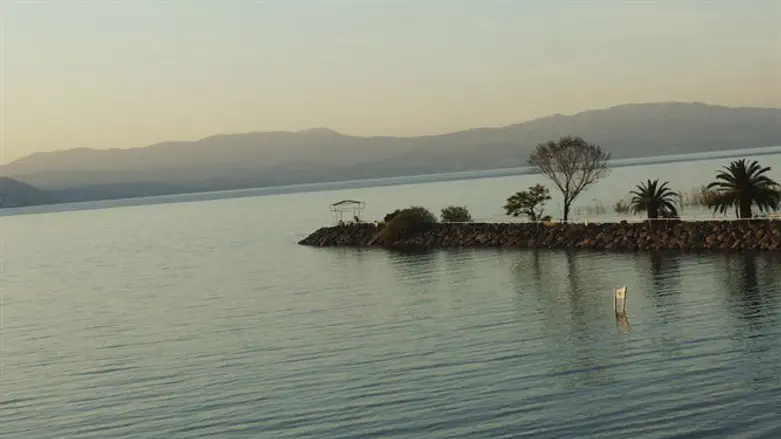
The amount of water added to the Kinneret (Sea of Galilee) during August 2017 was the lowest in a hundred years, Israel's Water Authority said.
After four consecutive years of not enough rainfall, Israel's Water Authority estimates that a fifth year will bring the Kinneret's water level to an unprecedented low next summer. In August, the Kinneret's water level dropped 27.5 centimeters (10.8 inches), dangerously close to 90 centimeters (35.4 inches) below the lower red line.
Water Authority spokesman Uri Shore said he hopes the coming winter will be different and the Kinneret will recover.
"The past four years have been arid, mostly in the north, and the water sources are in a very bad situation. The Kinneret and other places are breaking negative records," Shore said. "According to our forecasts and models, the winter will probably start off weak. I hope it's a mistake, but if G-d forbid the coming winter is similar to the previous four, then our water sources are going to be in huge trouble."
According to Shore, Israel is not suffering a water shortage like in previous decades, but if the Kinneret suffers, then so does the rest of Israel's nature.
"It's true that because of the Water Authority's preparations, and our desalination plants, everyone will have water in their homes, and we won't go back to a situation in which Israel dehydrates. But if we don't have enough rainfall, all of the green around us - nature, agriculture - will suffer very badly," he explained.
"In August, for example, we hit a record low. More water left the Kinneret than was added to it, and not because we're pumping water. For the past two years, we've pumped almost no water from the Kinneret. The water loss is because of evaporation. The lower the Kinneret gets, the higher the salinity level becomes, and that can influence life in the Kinneret and render it undrinkable.
"We hope this winter will be better, and we're bringing more water to Israel's north. Northern Israel has always been a rainy area, and the south has been a desert. Now things are changing. I don't know if it's because of global warming, or it's just cyclic, but after four arid years, if this continues we will have a problem. We need to figure out how to deal with it."